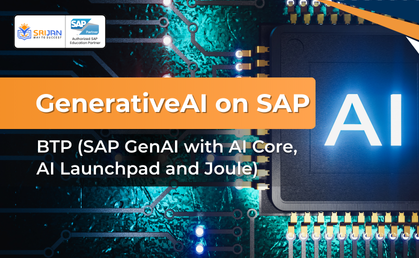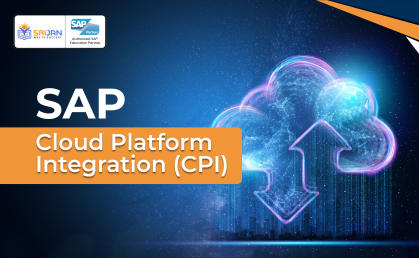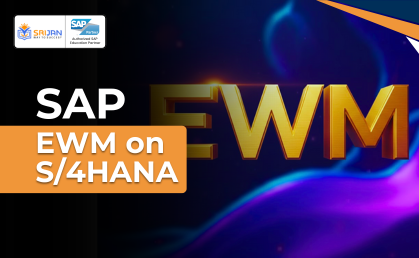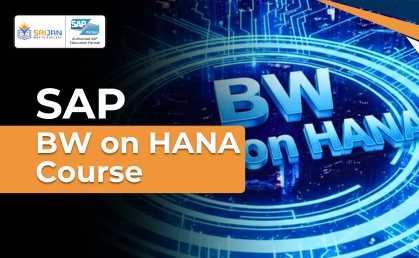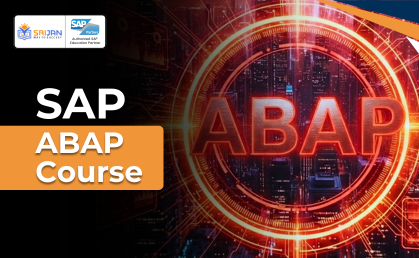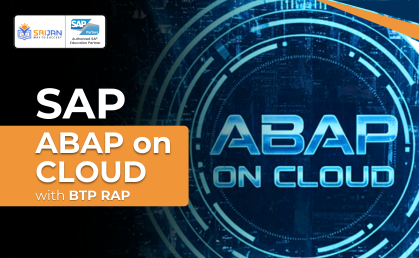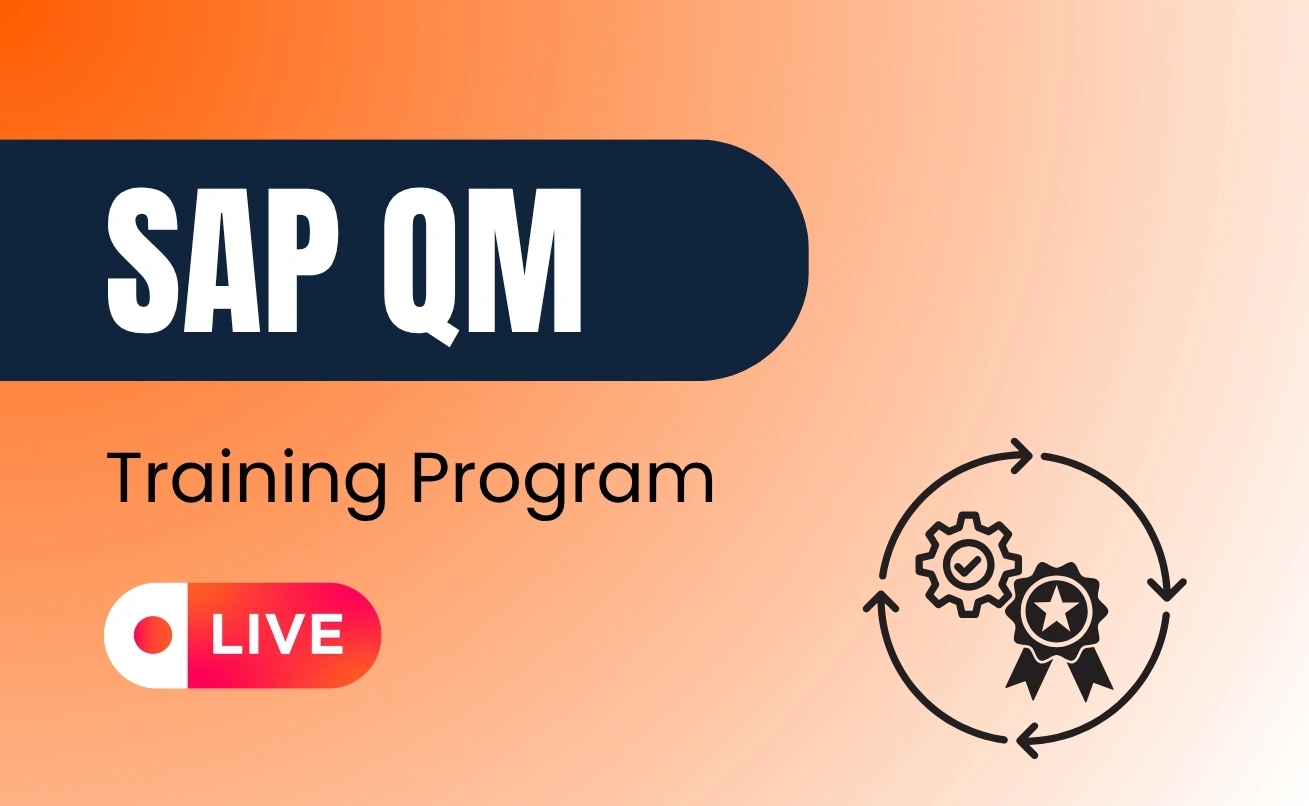SAP QM Course Online
Are you seeking to improve your skills in SAP, become a specialist in Quality Management, and gain access to a bundle of well-paid jobs? Srijan Institute's SAP QM Course Online is your gateway to all this.
What Is an SAP QM Course Online and Why Is It Valuable?
SAP QM (Quality Management) is the support that helps companies to keep a high level of quality in their business processes.
SAP QM Application in Business Operations
SAP QM is a tool that enables total quality control throughout the processes.
SAP QM Career Opportunities Expanding
The need for SAP QM experts will keep rising as time passes and more companies become interested.
About Srijan Institute’s SAP QM Online Classes
The SAP QM course online is designed to train you from scratch to master level with live projects and scenarios that reflect current industry practices.
Detailed SAP QM Course Content
Our SAP QM course content covers the complete lifecycle of quality management in SAP
- Material Master Quality Management View
- QM Configurations for Plant Parameters
- Configured & Design catalogs, Selected Sets,
- Master Inspection Characteristics (MICs) 1. Qualitative MIC 2. Quantitative MIC
- Inspection method.
- Sampling Procedure (Sample Determination)
- Defects Recording, Recording Results & Usage Decision
- Quality Notifications, QM Certificates, Certificate of Analysis (COA)
- QM Master Inspection Characteristics & Inspection Plans, Quality Info record, QM result
- recording, QM Usage Decision, Understanding of movement types related to PP /MM/QM.
- QM in procurement.
- QM in Sales and Distribution
- Inspection Points
- Inspection lot processing (inspection lot creation and inspection lot completion)
- Scenario creation for all Inspection Types & Inspection Lot Processing.
- Scenario Creating for all Inspections, like Incoming Inspection, In-process Inspection, and Final
- Inspection, Source Inspection, Recurring Inspection, etc.
Why Srijan Institute is the Best Choice for SAP QM Training Courses
At Srijan Institute, our SAP QM course online prepares you for career success, not just exams.
1. Comprehensive Training on the Latest SAP Technologies and Tools
2. Access to Expert Instructors and a Supportive Community of Fellow Learners
Gain from real experience-based teaching by SAP-certified professionals who have rich implementation experience over the years.
3. Course Completion Certificate
This certification will make your resume stronger, it will confirm your authenticity, and it will declare that you have mastered your skills to potential employers spread across the globe.
4. Real-Time End-to-End Project Implementation
The content of the course will be used in live projects that are very similar to real business scenarios.
5. Flexible Learning Options to Fit Your Schedule
The design of our online classes aims to ensure your convenience. Being a professional or a student, you can pick batches and timings that suit your schedule in the best possible way.
6. LMS Subscription for Lifetime
Enjoy midnight access to our Learning Management System (LMS) along with the course.
7. 100% Job Support End-to-End
The Srijan Institute accompanies you all the way to your career dream with its comprehensive career help program that includes resume preparation, placement guidance, and direct access to SAP job opportunities.
8. Free Server Access
The main thing in SAP is Practice. For this reason, we provide free access to live SAP servers, allowing you to execute hands-on exercises, projects, and simulations at no additional cost.
9. 3 Months Internship After Course Completion
Experience real organizational work processes and gain practical skills while working on real-time SAP projects in a 3-month internship after finishing the course – all this indirectly increases your employability to a huge extent.
How To Get Global Certification Through Srijan Institute?
Counseling
Engage in the Learning Process
Attend all lectures, webinars, and tutorials, participate actively in discussions, and complete all the projects assigned by the instructor
Course Completion Certificate
Complete the course as per the schedule and receive the certification from Srijan Institute and Training Center
Global Certification Exam
Get complete support for the Global Certification Exam, free exam dumps, and guidance to update your resume and LinkedIn profile with your new certification.
Conclusion
Reputation is made through quality, and achieving it is the pinnacle of your career.
The fee for QM(Quality Management) training can vary depending on several factors such as the location, duration of the course, training format, and level of expertise. SAP offers various training options for QM, including instructor-led courses, e-learning courses, and virtual live classrooms.
For More details you can Register
SAP QM(Quality Management) Certification:
SAP QM (Quality Management) certification is a credential that validates an individual's knowledge and expertise in the SAP Quality Management module. This certification is issued by SAP SE, the market leader in enterprise application software.
The SAP QM certification exam is designed to test a candidate's knowledge of SAP Quality Management processes, procedures, and best practices. The exam covers topics such as Quality Planning, Quality Inspection, Quality Control, Quality Notifications, Quality Certificates, and Quality Information System.
To become SAP QM certified, candidates must meet certain eligibility requirements, which typically include a minimum of two years of experience in SAP QM or a related field, or completion of relevant SAP QM training courses. The exam itself is a computer-based test consisting of multiple-choice questions, and candidates must score at least 65% to pass.
SAP QM(Quality Management) Curriculum:
1. Introduction to SAP QM
- Overview of SAP QM
- Quality management processes in SAP
- SAP QM user interface
2. Quality Planning
- Quality planning in SAP QM
- Inspection plan creation
- Sampling procedures and inspection methods
- Material specification creation
3. Quality Inspection
- Inspection lot creation and processing
- Quality notifications and defects recording
- Inspection results recording
- Quality reports and analysis
4. Quality Control
- Quality control in SAP QM
- Statistical process control
- Quality certificates and quality control charts
- Batch management and shelf life management
5. Quality Assurance
- Quality assurance in SAP QM
- Quality audits and continuous improvement
- Quality management in the supply chain
- Integration with other SAP modules
6. Advanced Topics
- Advanced quality planning and control
- Quality cost planning and analysis
- Quality management for regulated industries
- Advanced reporting and analytics
7. Introduction to SAP QM:
- Overview of SAP QM
- Quality management processes in SAP
- SAP QM user interface
8. Quality Planning:
- Quality planning in SAP QM.
- Inspection plan creation
- Sampling procedures and inspection methods
- Material specification creation
9. Quality Inspection:
- Inspection lot creation and processing
- Quality notifications and defects recording
- Inspection results recording
- Quality reports and analysis
10. Quality Control:
- Quality control in SAP QM
- Statistical process control
- Quality certificates and quality control charts
- Batch management and shelf life management
11. Quality Assurance:
- Quality assurance in SAP QM
- Quality audits and continuous improvement
- Quality management in the supply chain
- Integration with other SAP modules
12. Advanced Topics:
- Advanced quality planning and control
- Quality cost planning and analysis
- Quality management
SAP QM(Quality Management) Interview Questions & Answers:
1. What is SAP QM, and how does it relate to other SAP modules?
A: SAP QM is a module that manages quality in the production process. It integrates with other SAP modules such as SAP PP (Production Planning), SAP MM (Materials Management), and SAP SD (Sales and Distribution) to ensure that quality is maintained throughout the entire production cycle.
2. What are the different types of inspections in SAP QM?
A: There are two types of inspections in SAP QM: In-process inspections and Final inspections. In-process inspections are done during the production process to ensure that quality is maintained. Final inspections are done before the finished product is shipped to the customer.
3. What is a Quality Notification in SAP QM?
A: A Quality Notification is a document that is created to record any quality-related issues that occur during the production process. It is used to track the issue, identify the root cause, and assign corrective actions to prevent the issue from happening again.
4. What is the difference between Quality Control (QC) and Quality Assurance (QA)?
A: Quality Control (QC) is focused on the inspection and testing of the final product to ensure that it meets the required specifications. Quality Assurance (QA) is focused on the prevention of defects in the production process by implementing quality standards, processes, and procedures.
5. What is the purpose of the Inspection Plan in SAP QM?
A: The Inspection Plan is a document that defines the quality inspections that need to be done during the production process. It specifies the characteristics that need to be checked, the inspection methods to be used, and the acceptance criteria for each characteristic.
6. What is the difference between a Master Inspection Characteristic (MIC) and a Inspection Characteristic (IC)?
A: A Master Inspection Characteristic (MIC) is a template that defines a group of Inspection Characteristics (ICs) that have the same testing procedures and acceptance criteria. Inspection Characteristics (ICs) are the actual parameters that are checked during the quality inspection process.
7. What is the purpose of a Quality Certificate in SAP QM?
A: A Quality Certificate is a document that provides proof that the product meets the required quality standards. It includes information such as the batch number, the inspection results, and the acceptance criteria.
8. How does SAP QM help in achieving regulatory compliance?
A: SAP QM helps in achieving regulatory compliance by providing tools and processes to ensure that products meet the required quality standards. It also provides documentation and tracking capabilities to show that the required inspections and tests have been performed.
9. What is the purpose of the Quality Info Record in SAP QM?
A: The Quality Info Record is a document that stores quality-related information about a material or a vendor. It includes information such as the inspection plan, the quality certificates, and the vendor evaluation results.
10. What is the difference between a Quality Score and a Quality Rating in SAP QM?
A: A Quality Score is a numerical value that represents the quality of a product or a process. A Quality Rating is a subjective evaluation of the quality of a product or a process, usually done by a person or a team.
11. What is the purpose of the Quality Level in SAP QM?
A: The Quality Level is a parameter that defines the level of quality that is required for a particular material or product. It is used to set up the inspection plans and define the acceptance criteria for each characteristic.
12. How does SAP QM integrate with other SAP modules, such as SAP PP and SAP MM?
A: SAP QM integrates with other SAP modules by exchanging data and information between them. For example, SAP QM can receive information on the material and production order from SAP PP, and it can update the inventory and quality results in SAP MM.
13. What is the purpose of the Quality Management System (QMS) in SAP QM?
A: The Quality Management System (QMS) in SAP QM is a set of processes, procedures, and tools that ensure that the product meets the required quality standards. It includes activities such as planning, execution, and monitoring of the quality inspections.
14. What is the role of a Quality Inspector in SAP QM?
A: The role of a Quality Inspector in SAP QM is to perform quality inspections, record the inspection results, and initiate corrective actions if needed. The Quality Inspector also verifies that the product meets the required quality standards before it is released to the customer.
15. What is the difference between a Quality Control Plan (QCP) and a Quality Assurance Plan (QAP)?
A: A Quality Control Plan (QCP) is a document that defines the procedures and activities that need to be done to ensure that the product meets the required quality standards. A Quality Assurance Plan (QAP) is a document that outlines the quality objectives and standards that need to be achieved for the project or product.
16. What is the purpose of the Quality Certificate Profile in SAP QM?
A: The Quality Certificate Profile is a document that defines the format and content of the Quality Certificate. It includes information such as the layout, the header and footer, and the signature block.
17. What is the difference between a Vendor Evaluation and a Source Inspection in SAP QM?
A: A Vendor Evaluation is a process that evaluates the performance of the vendor based on predefined criteria such as quality, delivery, and cost. A Source Inspection is a quality inspection that is done at the vendor's location before the material is received at the customer's location.
18. What is the purpose of the Quality Scorecard in SAP QM?
A: The Quality Scorecard is a document that tracks the quality performance of a vendor or a material over time. It includes information such as the quality ratings, the delivery performance, and the cost performance.
19. What is the purpose of the Quality Audit in SAP QM?
A: The Quality Audit is a process that evaluates the effectiveness of the Quality Management System (QMS) in meeting the required quality standards. It includes activities such as reviewing the documentation, interviewing the personnel, and observing the processes.
20. What is the role of a Quality Manager in SAP QM?
A: The role of a Quality Manager in SAP QM is to oversee the Quality Management System (QMS) and ensure that the product meets the required quality standards. The Quality Manager also manages the quality team and coordinates with other departments to ensure that quality is maintained throughout the production cycle.
Participants will have 24/7 access to our online lab, providing hands-on experience with SAP QM tools and scenarios.
This includes server access to S/4 HANA 2023 for 1 year, ensuring you have ample time to practice and apply your skills in a real-world environment.
With this extended access, you can work on projects, explore advanced features, and solidify your understanding of SAP QM in the latest SAP S/4 HANA version.
0
Satisfied Students0
Years of Excellence0
Practical TrainingCourse Certification
SAP QM(Quality Management) Certification:
SAP QM (Quality Management) certification is a credential that validates an individual's knowledge and expertise in the SAP Quality Management module. This certification is issued by SAP SE, the market leader in enterprise application software.
The SAP QM certification exam is designed to test a candidate's knowledge of SAP Quality Management processes, procedures, and best practices. The exam covers topics such as Quality Planning, Quality Inspection, Quality Control, Quality Notifications, Quality Certificates, and Quality Information System.
To become SAP QM certified, candidates must meet certain eligibility requirements, which typically include a minimum of two years of experience in SAP QM or a related field, or completion of relevant SAP QM training courses. The exam itself is a computer-based test consisting of multiple-choice questions, and candidates must score at least 65% to pass.
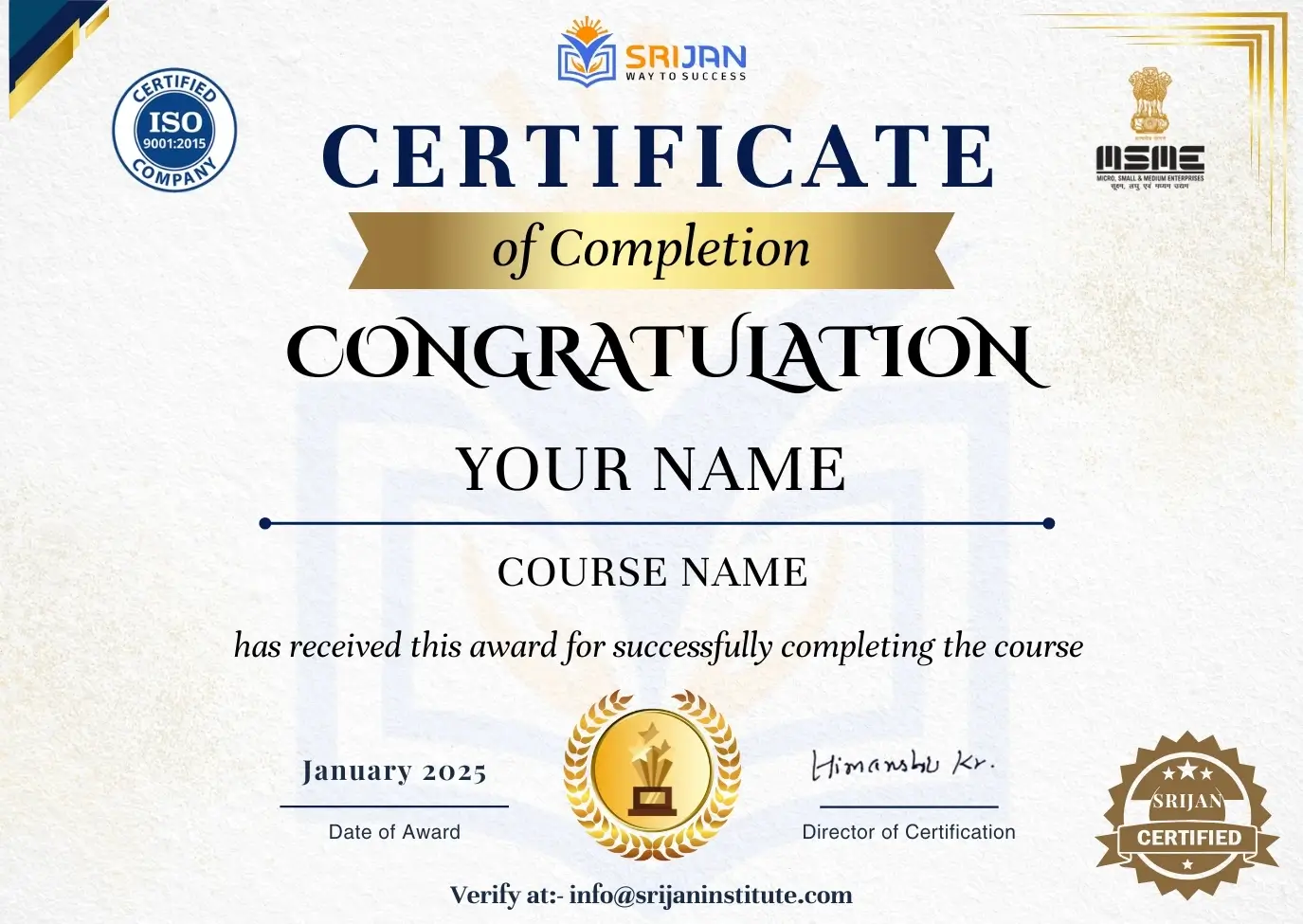
Our Hiring Partners
Our Popular Instructors
Meet our most talented and popular instructors

Mr. Manoj Pandey
SAP| MM| EWM|Ariba|erSAP Global Certified|SAP Consultant
- 12+ Years SAP Experience
- 6K+ Students Trained
- Real-Time Project Training

Mr. Amrit Raj
Full Stack SAP Developer CUM ABAP On HANA Trainer | SAP BTP Developer | Full Stack Developer | ERP & Data Science| SAP Global Certified
- 10+ Years SAP Experience
- 5k+ Students Trained
- Real-Time Project Training

Mr. Sudheer Sharma
SAP| FICO|Trainer|SAP Consultant
- 15+ Years SAP Experience
- 10k+ Students Trained
- Real-Time Project Training

Priyanshu Panday
SAP Basis and Security Consultant
- 4+ Years SAP Experience
- 2.5k+ Students Trained
- Real-Time Project Training

Buddhi Vishwas
SAP HCM | SAP SuccessFactors | Employee Central | RCM | PMGM | SAP Global Certified | SAP Consultant
- 8+ Years SAP Experience
- 3k+ Students Trained
- Real-Time Project Training
Choose Us
Why Choose Our SAP QM Course
-
01
Comprehensive Curriculum: Our SAP QM Training is all about covering the entire quality planning, inspection, and audit procedures. The syllabus of the SAP QM Course has been designed keeping in mind the certification requirements.
-
02
Hands-On Training: Practice projects and simulations give you a chance to apply your QM knowledge in real situations. That means you can jump into the job with brighter and better quality management skills.
-
03
Professional Guidance: Qualified SAP trainers make learning complex QM processes easy and applicable. Their mentorship enables you to succeed in your certification and career.
Choose Your SAP QM Course Learning Plan
Pick the SAP QM Course batch that best fits your schedule—ongoing, upcoming, and recorded options.
On-Going Batch
- First Batch Start Date: 13th January 2026
- Second Batch Start Date: 27th January 2026
($676)
Upcoming Batch
- First Batch Start Date: 10th February 2026
- Second Batch Start Date: 24th February 2026
($676)
Learn At Your Own Pace
-
Enroll to access full recorded sessions, implementation notes, and completion certificate.
Self Paced Courses
Learn anytime, anywhere with our curated recorded courses
SAP QM Course FAQs
The starting point of the course is Quality Management Basics. No prior experience with SAP is necessary. Eventually, it moves upward to advanced QM implementation concepts of SAP.
The answer is yes. Along with a certified course completion certificate as an ISO from Srijan Institute, you will be completely prepared to take the official SAP QM worldwide certification exam.
For sure. Our course is constructed so that you may take it whenever it fits your schedule. The flexible online learning mode is equally acceptable for students and professionals.
Yes, Srijan Institute has more than one payment option for you. We have an easy installment plan where you can pay a part of the course fee without any extra charges for the duration of your course.
Level Up Your Skills with Our SAP QM Course Today!
Unlock Your Career Potential with Our SAP QM Course and Start Learning Today and Gain the Skills Employers Demand!



